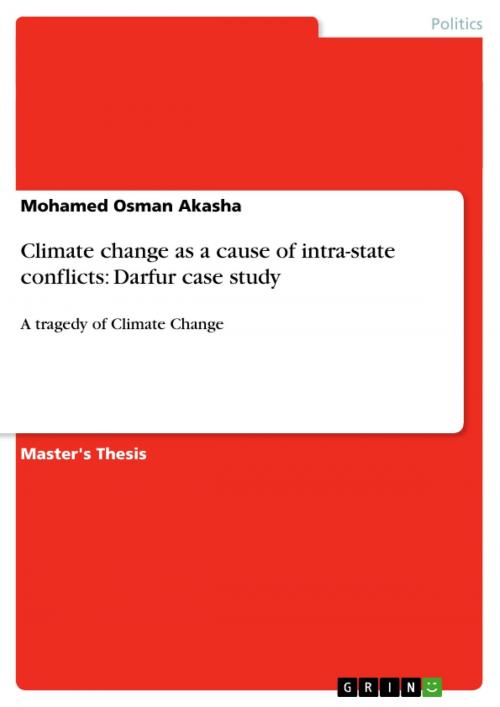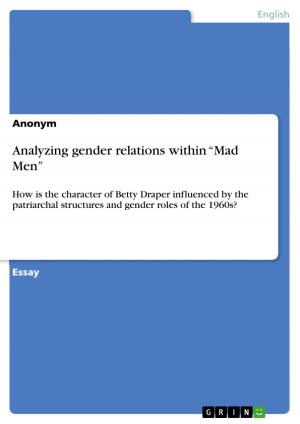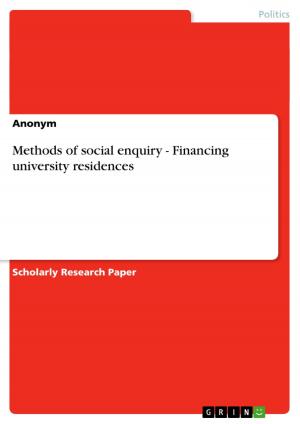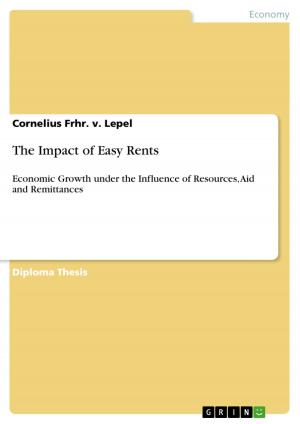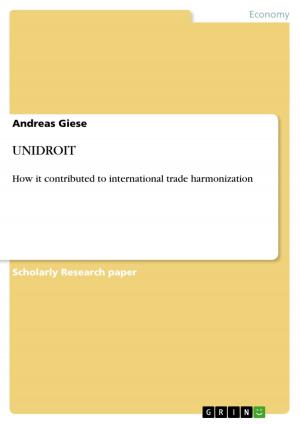Climate change as a cause of intra-state conflicts: Darfur case study
A tragedy of Climate Change
Nonfiction, Social & Cultural Studies, Political Science, International, International Security| Author: | Mohamed Osman Akasha | ISBN: | 9783656377399 |
| Publisher: | GRIN Publishing | Publication: | February 25, 2013 |
| Imprint: | GRIN Publishing | Language: | English |
| Author: | Mohamed Osman Akasha |
| ISBN: | 9783656377399 |
| Publisher: | GRIN Publishing |
| Publication: | February 25, 2013 |
| Imprint: | GRIN Publishing |
| Language: | English |
Master's Thesis from the year 2012 in the subject Politics - International Politics - Topic: Peace and Conflict Studies, Security, grade: A, , course: International security, language: English, abstract: Climate change presents a serious threat to the security and prosperity of all countries. The effects of climate change and its security implications have now been at the forefront of international attention. Academic researches on environmental change and security gained popularity in political science and security studies in the 1990s. With Cold War-related security issues on the decline, policymakers began looking more closely at non-traditional security concerns such as environmental change, poverty and diseases. In so doing, the idea of what constituted state security expanded beyond the risk of direct military aggression from hostile states to concerns about the regional instability that could affect economic security and draw governments into regional conflicts. Many quantitative and qualitative studies conclude that, climate change in itself is unlikely to produce violent conflict, but rather, it could serve as a 'threat multiplier' whereby environmental degradation caused by climate change may exacerbate many of the underlining causes linked to violent conflict. However this conclusion is widely generalized, since it has put all countries in one basket despite the numerous differences and variation between countries as far as adaptive capacities and mitigation mechanism are concerned. Using Darfur as a case study, this dissertation examines the effects of climate change in poor or less developed countries, and critically analyzing the concept of climate change as a security threat that has ignited the conflict in Darfur, critically analyzing the role of drought, desertification, decreased rainfall, land degradation and migration in the conflict in Darfur. This study seeks to answer one question: whether the root causes of this crisis related to climate change? While acknowledging the prominent role of the International community in solving this crisis, this work intends to prove that, the absence of a common view on the nature and causes of the conflict has hampered international convergence about how to act on the Darfur crisis. This has delayed a coherent response and has contributed to the escalation of the conflict. Also the mischaracterization of the causes and nature of the conflict in Darfur has contributed to oversimplified views, which allowed the conflict to be politicized in a way that has complicated the search for solutions. .
Th author: H e studied political science and then conducted postgraduate studies at Clingindael Institute in Netherlands and the Canadian Institute for conflict prevention and the American Conflict Resolution, And Resource Institute and Saint Paul university. He continued researching at the University of East Anglia. He served in the diplomatic corps as a diplomat for twelve years.
Master's Thesis from the year 2012 in the subject Politics - International Politics - Topic: Peace and Conflict Studies, Security, grade: A, , course: International security, language: English, abstract: Climate change presents a serious threat to the security and prosperity of all countries. The effects of climate change and its security implications have now been at the forefront of international attention. Academic researches on environmental change and security gained popularity in political science and security studies in the 1990s. With Cold War-related security issues on the decline, policymakers began looking more closely at non-traditional security concerns such as environmental change, poverty and diseases. In so doing, the idea of what constituted state security expanded beyond the risk of direct military aggression from hostile states to concerns about the regional instability that could affect economic security and draw governments into regional conflicts. Many quantitative and qualitative studies conclude that, climate change in itself is unlikely to produce violent conflict, but rather, it could serve as a 'threat multiplier' whereby environmental degradation caused by climate change may exacerbate many of the underlining causes linked to violent conflict. However this conclusion is widely generalized, since it has put all countries in one basket despite the numerous differences and variation between countries as far as adaptive capacities and mitigation mechanism are concerned. Using Darfur as a case study, this dissertation examines the effects of climate change in poor or less developed countries, and critically analyzing the concept of climate change as a security threat that has ignited the conflict in Darfur, critically analyzing the role of drought, desertification, decreased rainfall, land degradation and migration in the conflict in Darfur. This study seeks to answer one question: whether the root causes of this crisis related to climate change? While acknowledging the prominent role of the International community in solving this crisis, this work intends to prove that, the absence of a common view on the nature and causes of the conflict has hampered international convergence about how to act on the Darfur crisis. This has delayed a coherent response and has contributed to the escalation of the conflict. Also the mischaracterization of the causes and nature of the conflict in Darfur has contributed to oversimplified views, which allowed the conflict to be politicized in a way that has complicated the search for solutions. .
Th author: H e studied political science and then conducted postgraduate studies at Clingindael Institute in Netherlands and the Canadian Institute for conflict prevention and the American Conflict Resolution, And Resource Institute and Saint Paul university. He continued researching at the University of East Anglia. He served in the diplomatic corps as a diplomat for twelve years.
